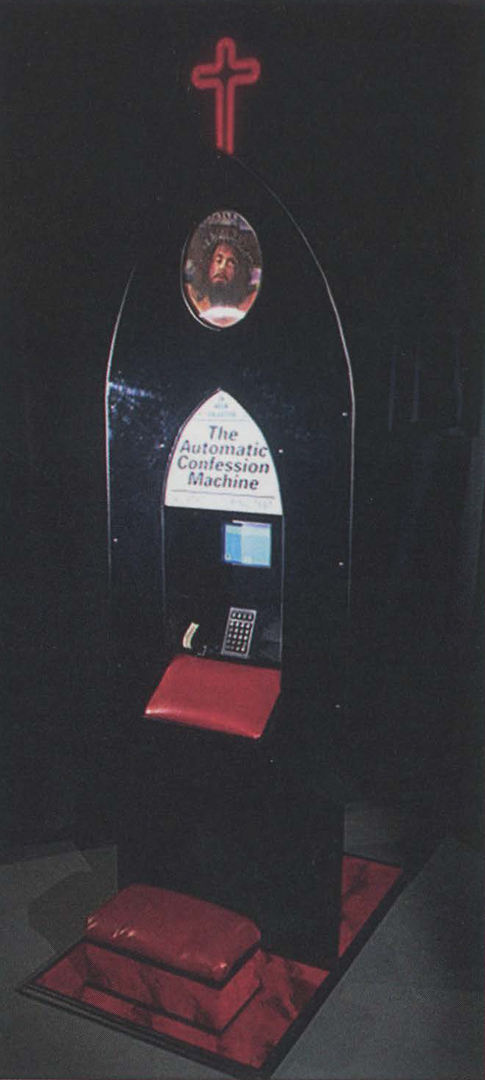Gregory P. Garvey: The Automatic Confession Machine A Catholic Turning Test
Artist(s):
Title:
- The Automatic Confession Machine A Catholic Turning Test
Exhibition:
Creation Year:
- 2007
Medium:
- iMac, keypad, plexi-glass, wood, carpet, fluorescent light, neon light, faux leather
Size:
- 96 inches x 36 inches x 48 inches
Category:
Artist Statement:
“But what if God himself can be simulated, that is to say, reduced to the signs which attest to his existence?” – Jean Baudrillard, Simulations, 1983 “The human speaker will contribute much to clothe ELIZA’s responses in vestments of plausibility.” – Joseph Weizenbaum, discussing ELIZA in 1966 “Hence, I have no doubt but that every one is absolved from his secret sins when he has made confession, privately before any brother.”– Martin Luther, The Babylonian Captivity of the Church, 1520 The Automatic Confession Machine (ACM): A Catholic Turing Test is a computerized confessional designed and fabricated to resemble an automatic banking machine (ATM). This work is inspired by memories of the Catholic Sacrament of Confession and the Turing test for artificial intelligence. In his 1950 essay entitled “Computer Machinery and Intelligence,” Alan Turing replaced the question “Can machines think?” with “Are there imaginable digital computers which would do well in the imitation game?” With this maneuver, an intractable philosophical problem becomes a simple problem of interface design. This artwork should not be misunderstood as an attack against religious faith. Rather, it serves as a warning of the potential of technology to intrude into the most private sphere of our personal convictions. The doubting Thomas kneeling at this automated confessional must make a digital leap of faith and surrender to a belief in the power of silicon absolution. Thus the user/sinner can experience the ecstasy of forgiveness in a Manichean system governed by the binary logic of good and evil, where guilt, shame, sin, and salvation are all input variables that determine the catechism of output: namely how many Hail Marys and Our Fathers must be said for redemption.
Technical Information:
First deployed in 1993, ACM Release 5.0.1 retains the look and feel of the original user interface design. Originally developed using Hypertalk/Hypercard running under OS 8.6, it has been converted to SuperCard and repeatedly upgraded and now runs under OSX and will be soon available on many mobile devices. A sinner’s spiritual accounting requires selections from a menu of the seven deadly sins and the Ten Commandments. When the Amen key is pressed, forgiveness is computed, and the user receives appropriate penance as confirmation of the transaction.





